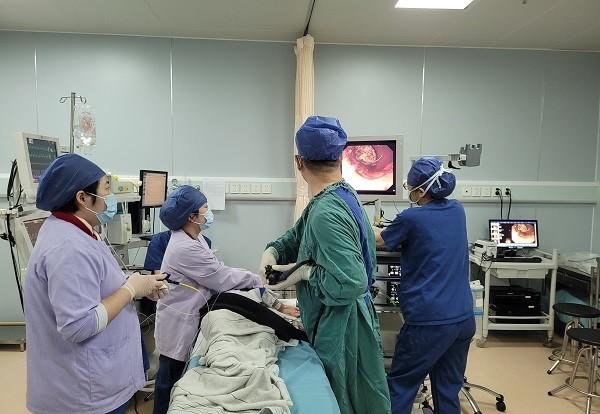
Pictured: A 5-year-old child eats persimmon cakes and finally forms a "stone" in his stomach and goes to Shanghai Children's Hospital for hospital supplies
In autumn and winter, many places have the habit of eating sweet and delicious persimmon cakes, a 5-year-old child eats persimmon cakes, and finally forms a "stone" in the stomach, after going to Shanghai Children's Hospital for treatment, the endoscopic center uses "lithotripsy" (various endoscopic treatment tools) to cut the gastrolithic stones and successfully removes them, relieving the child's heart "abdomen" for up to two weeks.
We often say that delicious things "eat until vomit", and the result really happened to Xiao Wei (pseudonym). Two weeks ago, the parent bought back his favorite persimmon cake, wolfed down several times in a row, vomited 2 times in a row, spit out a lump of persimmon cake, the parents can even feel a lump on his stomach. In the next few days, Xiao Wei occasionally felt a little pain in his stomach, but it was not very severe, and his parents did not pay special attention to it, until a week later, he found that the lump on his stomach was not significantly reduced, so he went to the local hospital for treatment, and after ultrasonography, it was found that it may be gastrolithiasis. This refers to the accumulation of certain foods, drugs, indigestible items, foreign bodies, etc. in the stomach to form special coagulations or hard blocks that can neither be digested nor discharged in time. After a gastroscopy at the local hospital, it was found that it could not be removed, and he was advised to drink Coke "fossils". However, after five days, the hard lump in the child's left upper quadrant did not shrink, and the child still felt abdominal pain. For further consultation, parents decided to take their children to Shanghai Children's Hospital for treatment.
At this time, the "stone" has been coagulating in the stomach for two weeks, and the ultrasound examination found that the size is almost the size of a duck egg, which has seriously affected the child's normal diet and must be removed immediately. Due to the large size of the gastrolaria, it is not possible to remove it directly in its entirety. Under the auspices of Chief Physician Liu Haifeng, the endoscopy center took 4 hours, successively using a number of endoscopic treatment tools such as snares and foreign body forceps, cutting the gastrolars into small pieces, and then using a net pocket for a small number of times to finally drag all these gastrolars out of the body, with a total weight of more than 100 grams (about two or two weights). Due to the long residual time, the child already has two large ulcers in the stomach, but fortunately there is no abnormality in the duodenum and mucous membrane below.
Chief physician Liu Haifeng said that gastrolithiasis is a rare digestive tract disease, and it is even rare for 5-year-old children to form gastrolers the size of duck eggs in a short period of time. Gastrolithia are mostly clumps formed in the stomach, and those with large size cannot pass through the pylorus and remain in the stomach, and those with small size can enter the small intestine to cause intestinal obstruction. The most common are plant gastrolithiasis caused by pica eating hair that cannot be digested, or eating persimmons and other foods that contain more tannic acid (such as hawthorn, black dates). Because a large amount of tannic acid can be combined with the protein components in the stomach to form a "stone". Eating foods such as persimmons, hawthorns, or dates on an empty stomach or in large quantities raises the risk of gastrolithiasis. In particular, people with poor digestive function and children with poor gastric motility are recommended to eat less of the above fruits. Especially for preschool children, parents should remind their children that no matter how delicious things are, they cannot overeat "eat to vomit".
Xinmin Evening News reporter Zuo Yan